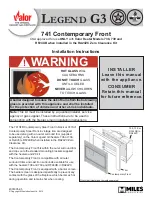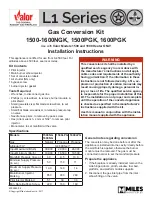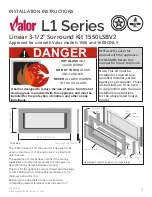
THE LP-GAS CYLINDER (Propane Tank) INFORMATION:
Propane Cylinder Size - Capacity: 20 Lbs. (9kg) or 4.7 Gallons (17.8 Liters) of Propane
DO NOT OVERFILL
BEFORE INSTALLATION, BE SURE THE LP-GAS CYLINDER/PROPANE TANKS VALVE IS CLOSED.
CONNECTING AN LP-GAS CYLINDER/PROPANE TANK TO THE FIRE PIT
IMPORTANT
BEFORE PROCEEDING, CAREFULLY READ ALL OF THE IMPORTANT
SAFETY INFORMATION IN THIS OWNER'S MANUAL
A.
Important WARNINGS and Safety Information (Pages 1, 2, 3, 4)
B.
Minimum Clearance to Combustibles (Page 2)
1.
2. The LP-Gas Cylinder(s) to be used must be constructed and marked in accordance with the U.S. Department of
Transportation (D.O.T.) Specifications for LP-Gas Cylinders or the Standard for Cylinders, Spheres and Tubes for Transportation
of Dangerous Goods and Commission, CAN/CSA-B339 as applicable.
--Use cylinders approved for your area such as “Blue Rhino” or “AmeriGas” with this appliance. Other cylinders may be
acceptable for use with the appliance provided they can be mounted to the appliance using the cylinder retention devise provided.
(See illustration above.)
--The LP-Gas Cylinder to be used must be provided with a listed overfilling prevention device (OPD) and with a cylinder
connection device compatible with the connection for the appliance.
3. Make sure the appliance is NOT in use, and turn OFF the gas at the supply LP-Gas Cylinder Valve.
4. The LP-Gas Cylinder must be disconnected when the appliance is not in use.
5. The LP-Gas Cylinders must be stored outdoors in a well-ventilated area out of the reach of children & at Least 60 inches away for
the fire pit. Disconnected cylinders must have threaded valve caps tightly installed and must not be stored in any building, garage,
or other enclosed area.
6. The LP-Gas Cylinder must be standing on the designed bottom base of the cylinder for proper vapor withdrawal.
When connecting the regulator to the tank valve, make sure the coupling nut does not cross-thread on the tank valve.
Cross-threading the regulator nut to the tank valve may cause a leak.
Turn on the gas to the burner system and test for leaks with soapy water solution.
(
Never use an open flame for testing
). If a leak is found, re-connect the regulator coupling nut and tighten until no leaks are
detected.
The hose and burner should be inspected before each use of the appliance.
The hose assembly must be replaced prior to the appliance being put into operation if there is evidence of excessive abrasion or wear,
or if the hose is damaged. The replacement hose must be specified by the manufacturer.
Page 5






































